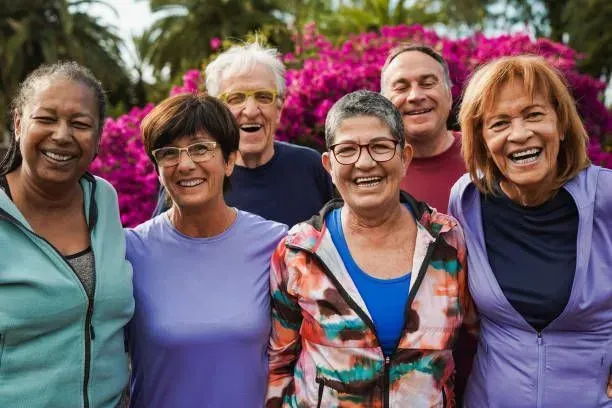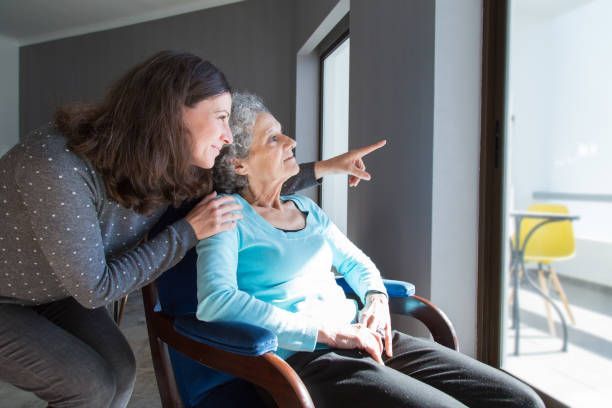Boosting Seniors' Mental Health: Ideas and Tips for a Bright Mind
Boosting Seniors' Mental Health:
Ideas and Tips for a Bright Mind
At 7 Day Home Care, we recognize that seniors' mental health is as critical as their physical well-being, and we are dedicated to providing comprehensive support to ensure their emotional and cognitive vitality. As seniors age, they may face challenges such as social isolation, cognitive decline, and the emotional toll of chronic health conditions, all of which can significantly impact their mental health. Our approach includes personalized care plans that focus on mental well-being, integrating activities that stimulate the mind, foster social connections, and promote emotional resilience. By offering compassionate, tailored support, we help seniors maintain a positive outlook, enhance their cognitive function, and improve their overall quality of life, allowing them to enjoy their golden years with a bright and engaged mind.

Mental Health for Seniors Requires Proper Awareness, Strategies, and Support
As we age, maintaining mental health becomes increasingly important. Mental well-being in seniors is crucial for their quality of life, physical health, and longevity. However, the journey to keeping a bright mind in later years can come with challenges. The good news is that with proper awareness, strategies, and support, seniors can sustain and even enhance their mental wellness. This article explores the latest trends and provides actionable tips to promote mental health among seniors, aimed at helping them live fuller, more connected, and joyful lives.
Understanding the Importance of Mental Health in Seniors
Mental health is as important as physical health, especially in the elderly. It encompasses emotional, psychological, and social well-being, influencing how seniors think, feel, and behave. Good mental health can improve seniors' ability to handle stress, relate to others, and make decisions.
Unfortunately, mental health issues are common among older adults. According to the World Health Organization (WHO), approximately 15% of adults aged 60 and over suffer from a mental disorder. Depression and anxiety are particularly prevalent, though often underdiagnosed and untreated. This neglect can lead to a decreased quality of life and may exacerbate physical health issues. Recognizing the significance of mental health and staying informed about the latest trends and practices is vital for seniors, their families, and caregivers. Let's review current trends in seniors' mental health and explore how they can be effectively managed.
Trends in Seniors' Mental Health
Increased Focus on Mental Health Awareness
One of the most encouraging trends is the growing awareness of mental health issues among seniors. Previously, mental health was often overlooked in favor of physical health, but this is changing. More healthcare providers are incorporating mental health screenings into routine check-ups, allowing for earlier diagnosis and treatment of issues like depression and anxiety. Additionally, public awareness campaigns are educating seniors and their families about the signs and symptoms of mental health problems, reducing stigma and encouraging those affected to seek help. As awareness grows, so does access to resources, enabling better mental health outcomes.
Telehealth and Remote Mental Health Services for Seniors
The rise of telehealth has revolutionized mental health care for seniors. Telehealth platforms allow seniors to access mental health services from the comfort of their homes, reducing barriers like mobility issues or lack of transportation. These services have become increasingly popular, especially since the COVID-19 pandemic, which highlighted the need for remote healthcare solutions.
Teletherapy, online support groups, and virtual wellness programs have made it easier for seniors to receive regular mental health care, even in remote or underserved areas. This accessibility has proven invaluable for ongoing mental health management, offering flexibility and continuity of care.
Holistic and Integrative Approaches for Seniors Mental Health
Seniors are increasingly turning to holistic and integrative approaches to support their mental health. These methods focus on treating the whole person—mind, body, and spirit—rather than just addressing specific symptoms. Practices such as mindfulness, yoga, meditation, and tai chi have gained popularity among seniors for their mental health benefits, including reduced anxiety, improved mood, and enhanced cognitive function. Integrative care often includes combining traditional medical treatments with complementary therapies, such as acupuncture, nutritional counseling, and exercise programs tailored to seniors. This trend reflects a broader shift towards personalized healthcare that acknowledges the complex interplay between physical and mental well-being.
Technology for Seniors Cognitive Health
Technology is playing a crucial role in supporting cognitive health among seniors. Brain-training apps, online puzzles, and memory games are designed to keep the mind sharp and combat cognitive decline. These tools are often user-friendly and can be accessed on smartphones or tablets, making them accessible for many seniors. Moreover, virtual reality (VR) is emerging as a tool for cognitive stimulation, offering immersive experiences that can enhance memory, attention, and problem-solving skills. Some VR programs are designed specifically for seniors, providing engaging and therapeutic environments that promote mental health.
Social Connection and Community Engagement for Seniors
Maintaining social connections is vital for seniors' mental health, and there's a growing trend towards fostering community engagement among older adults. Senior centers, community organizations, and even digital platforms are offering more opportunities for seniors to stay socially active, whether through group activities, volunteer work, or online communities. Social isolation can significantly impact mental health, leading to loneliness and depression. By prioritizing social engagement, seniors can build supportive networks that enhance their emotional well-being and provide a sense of purpose and belonging.
Tips for Maintaining and Enhancing Seniors' Mental Health
Now that we've explored the latest trends in seniors' mental health, let's focus on actionable tips to help maintain and enhance mental well-being.
Staying Physically Active is Imperative for Mental Health
Physical activity is not only essential for physical health but also for mental health. Exercise releases endorphins, which are natural mood boosters, and can help reduce symptoms of depression and anxiety. Regular physical activity also supports cognitive function by improving blood flow to the brain and promoting the growth of new neurons. For seniors, low-impact exercises like walking, swimming, yoga, or tai chi are excellent options. These activities can improve flexibility, balance, and strength while also providing social interaction if done in groups.
Nourish the Mind with a Healthy Diet
A balanced diet rich in nutrients is key to maintaining mental health. Omega-3 fatty acids, found in fish, walnuts, and flaxseeds, are particularly beneficial for brain health and can help reduce the risk of cognitive decline. Antioxidants, found in fruits and vegetables, protect the brain from oxidative stress and support overall mental function. Seniors should aim to eat a diet that includes a variety of whole foods, such as leafy greens, berries, nuts, seeds, lean proteins, and whole grains. Staying hydrated is also crucial, as dehydration can affect mood and cognitive abilities.
Engage in Mental Exercises
Keeping the mind active is crucial for cognitive health. Seniors should engage in activities that challenge their brain, such as puzzles, reading, writing, or learning a new skill or hobby. Brain-training apps and online games designed to enhance memory, attention, and problem-solving skills can also be effective. Incorporating these mental exercises into a daily routine can help keep the mind sharp and reduce the risk of cognitive decline.
Maintain Social Connections
Social interaction is one of the most powerful tools for promoting mental health in seniors. Whether it's staying in touch with family and friends, joining a club or group, or participating in community activities, regular social engagement can prevent feelings of loneliness and isolation. Seniors should strive to stay connected, whether through in-person interactions or digital communication platforms. Engaging in volunteer work or mentoring younger generations can also provide a sense of purpose and fulfillment.
Practice Mindfulness and Relaxation Techniques
Mindfulness and relaxation techniques can significantly reduce stress and improve mental health. Practices such as deep breathing, meditation, and progressive muscle relaxation can help seniors manage anxiety and enhance emotional well-being. Mindfulness involves paying attention to the present moment without judgment. This practice can be especially beneficial for seniors, as it promotes a sense of calm, helps manage pain, and improves focus and concentration.
Seek Professional Support When Needed
It's important for seniors and their caregivers to recognize when professional help is needed. Mental health issues such as depression, anxiety, or cognitive decline should be addressed with the help of a healthcare professional. Early intervention can prevent the worsening of symptoms and lead to better outcomes. Seniors should not hesitate to reach out to a mental health provider, counselor, or therapist if they experience prolonged sadness, excessive worry, or other symptoms that affect their daily life. Telehealth services make it easier than ever to access professional support from home.
Seniors Need to Prioritize Sleep
Good sleep is essential for mental health. Seniors often experience changes in sleep patterns, but it’s crucial to prioritize quality sleep to support cognitive function and emotional well-being. Poor sleep can lead to irritability, memory issues, and increased risk of mental health problems. Seniors should aim for 7-8 hours of sleep per night. Establishing a regular sleep routine, creating a comfortable sleep environment, and avoiding caffeine or heavy meals before bed can improve sleep quality.
Limit Stress Lifestyle
Chronic stress can have a detrimental effect on mental health, leading to anxiety, depression, and cognitive decline. Seniors should identify stressors in their life and take steps to manage or reduce them. This might include simplifying daily routines, seeking help with difficult tasks, or practicing stress-relief techniques like meditation or yoga. t's also important for seniors to take time for activities they enjoy, whether it's gardening, painting, or simply spending time with loved ones. These activities can provide a sense of joy and relaxation.
Stay Informed About Medication and Health Conditions
Many seniors take medications for various health conditions, and some medications can have side effects that impact mental health. It’s important for seniors to stay informed about the potential mental health side effects of their medications and discuss any concerns with their healthcare provider.
Additionally, managing chronic health conditions effectively can prevent them from negatively impacting mental health. Regular check-ups and open communication with healthcare providers are essential.
Embrace a Sense of Purpose
Having a sense of purpose is crucial for mental well-being, especially in later life. Seniors who feel they have a purpose are more likely to experience positive mental health. This purpose could come from various sources, such as hobbies, volunteer work, or spending time with grandchildren.
Seniors should explore activities and interests that give them a sense of fulfillment and joy. This might involve pursuing long-held passions, taking up new hobbies, or getting involved in community service.
Maintaining mental health in later years is a multifaceted journey that involves staying active, connected, and engaged. By staying informed about the latest trends in seniors' mental health and implementing these practical tips, seniors can enhance their mental well-being and enjoy a higher quality of life. Whether it's through physical activity, social engagement, or seeking professional support when needed, there are numerous ways to keep a bright mind well into the golden years. By prioritizing mental health, seniors can continue to live meaningful, fulfilling lives, full of joy and connection.
At 7 Day Home Care, we understand the importance of mental health for seniors and are committed to providing the support and resources needed to help seniors thrive. If you or a loved one need assistance in maintaining mental health or any other aspect of senior care, don’t hesitate to reach out to us. Together, we can ensure that every senior has the opportunity to live a happy, healthy, and mentally vibrant life. 7 Day Home Care is licensed by the New York State Department of Health to provide home care services in Manhattan, Queens, Brooklyn, Nassau County, and Suffolk County, New York. To learn more about our home care services, please call 516-408-0034.
Brian Callahan
7 Day Home Care










